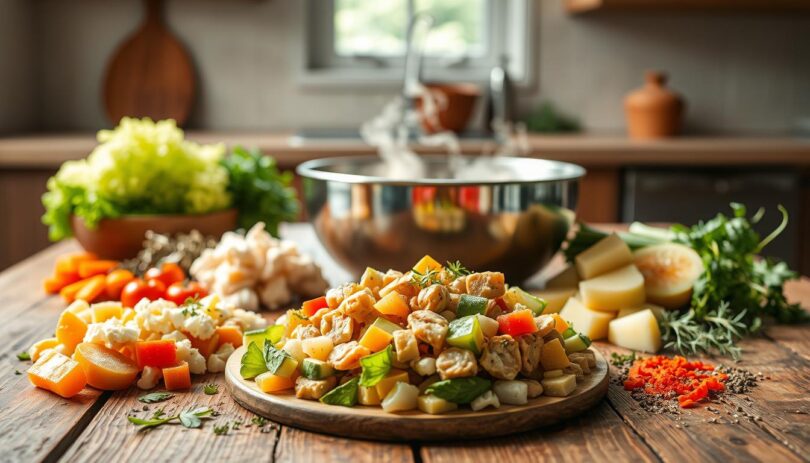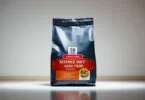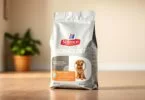Have you ever wondered if the food you're feeding your dog is truly the best for their health? Many pet owners are now turning to homemade dog food to ensure their pets get the nutrients they need without the risks associated with commercial products.
Choosing the right dog food can be a daunting task, especially with so many options available. However, homemade dog food offers a fresh and nutritious alternative that can be tailored to your dog's specific needs. In this article, we'll explore expert-approved recipes and provide practical tips to help you get started.
For instance, a Yorkie that switched to a homemade diet showed significant improvements in health and energy levels. This real-life example highlights the benefits of taking control of your dog's nutrition.
By avoiding processed foods and recalls, you can ensure your dog gets naturally sourced ingredients. Our recipes are cost-effective and cater to unique nutritional needs, making them a great choice for pet owners who want the best for their furry friends.
Our guide includes specific ingredient guidelines, preparation steps, and storage tips to make the process easy and convenient. Whether you're a seasoned cook or a novice in the kitchen, these recipes are designed to be simple and effective.
Understanding the Benefits of a Homemade Dog Diet
Feeding your pet can be a source of worry, especially with the risks linked to commercial dog food. Homemade dog diets offer a fresh, nutritious alternative that you can tailor to your pet's needs. This approach lets you control the ingredients, ensuring your pet gets the nutrients they need without the risks of processed foods.
High-quality ingredients in homemade diets can boost nutrient absorption and improve your pet's overall health. Balanced protein, carbs, fiber, and fats are crucial for long-term health. For example, using ground turkey or chicken provides essential protein, while fiber from vegetables supports digestion.
Switching to homemade dog food can also save money. While initial costs might seem high, making meals in bulk can be cost-effective. Expert sources suggest that homemade diets can be more economical than high-end commercial options, especially for multi-pet households.
However, it's important to use precise measurements and balanced recipes. Consulting a veterinary nutritionist ensures your pet gets all necessary nutrients. Avoid toxic ingredients like chocolate or grapes, and transition gradually to avoid digestive issues. With careful planning, homemade diets can offer a natural, healthy option for your pet.
Simple and Nutritious Dog Diet Recipes for a Healthier Pet
Creating a balanced and nutritious meal for your pet doesn’t have to be complicated. With the right ingredients and expert guidance, you can prepare meals that support your pet’s overall health and vitality.
Essential Ingredients for a Complete Meal
A well-rounded meal should include high-quality protein sources like ground turkey or chicken, along with complex carbohydrates such as brown rice or sweet potatoes. Adding a variety of vegetables like carrots, green beans, and spinach ensures a broad spectrum of vitamins and minerals. Proper portion control is crucial to maintain nutritional balance.
Expert-Approved Cooking Tips
Cooking gently helps retain the natural nutrients in the ingredients. Blanching vegetables before adding them to the meal preserves their color and texture. Using a food processor can help blend ingredients to the desired consistency without over-processing. For consistency, use accurate measuring tools to ensure each meal meets your pet’s nutritional needs.
Consulting with a veterinary nutritionist ensures that your pet’s meals are tailored to their specific needs, especially for pets with allergies or health conditions. Gradually introducing new ingredients helps prevent digestive upset, making the transition to homemade meals smooth and stress-free.
Step-by-Step Guide to Preparing Homemade Dog Meals
Preparing homemade meals for your pet can be a straightforward process with the right tools and knowledge. This guide will walk you through setting up your kitchen, storing meals properly, and cooking nutritious food for your furry friend.
Kitchen Setup and Equipment Essentials
To get started, you'll need a few essential tools. A food processor helps chop ingredients evenly, while a digital scale ensures precise measurements. Nonstick pans are ideal for gentle cooking. These tools will make the process efficient and help preserve nutrients.
Proper Storage and Portioning Techniques
Homemade meals can be stored in the fridge for up to 4 days or frozen for 2 months. Use airtight containers to maintain freshness. Portioning meals in advance makes serving convenient and ensures your pet gets the right amount each time.
Measuring Ingredients and Cooking Methods
Accuracy is key when measuring ingredients. For a 15-lb dog, a balanced recipe might include 300 grams of food daily, with protein sources like ground turkey and complex carbs like rice. Steam vegetables to retain vitamins and cook proteins gently to preserve nutrients.
Batch Cooking and Efficiency
Preparing meals in bulk saves time and ensures consistency. Divide cooked food into portions and store them appropriately. This method keeps meals fresh and reduces kitchen time, making it easier to maintain your pet's diet.
Customizing Recipes for Your Dog's Nutritional Needs
Every pet is unique, and their food should be too. Customizing homemade dog food recipes ensures your furry friend gets exactly what they need to thrive.
Adjusting Portions and Caloric Intake
Veterinary guidelines recommend calculating calories based on your dog’s weight and activity level. For example, a 15-pound dog needs about 443 kcal daily. Adjusting portions helps maintain a healthy weight and energy level.
Start with high-quality protein like ground turkey, paired with complex carbs like rice. Add fiber-rich veggies for digestion. Use a reliable food scale to measure ingredients accurately, ensuring each meal is balanced and complete.
Monitor your dog’s weight weekly and adjust recipes as needed. If they gain or lose weight, tweak portion sizes. Gradual changes prevent digestive upset and keep your pet comfortable.
Consult a vet or pet nutritionist for personalized advice, especially for dogs with health issues. They can help create a tailored plan that meets your dog’s specific needs.
By customizing your dog’s meals, you ensure they get the nutrients they need for optimal health. With a little planning and expert guidance, you can create delicious, balanced meals your pet will love.
Tips for Preventing Nutrient Deficiencies and Ensuring Freshness
Maintaining your pet's health through homemade meals requires careful planning and attention to detail. Ensuring your dog gets all the necessary nutrients is crucial for their overall wellbeing.
Strategies to Monitor Your Dog's Health
Regular monitoring is key to preventing nutrient deficiencies. Start by tracking your dog's weight weekly and observing changes in their energy levels and coat condition. A dull coat or lethargy could signal a nutritional imbalance.
Proper food storage is essential to maintain freshness. Store homemade meals in airtight containers in the fridge for up to four days or freeze for up to two months. This prevents spoilage and keeps nutrients intact.
When serving, use a food scale to measure portions accurately. For example, a 15-pound dog needs about 300 grams of food daily. Include a variety of ingredients like ground turkey for protein and vegetables for fiber.
Consult your vet about adding vitamin and mineral supplements to ensure your dog's meals are balanced. Also, cook ingredients at the right temperatures to preserve nutrients and add a touch of oil for fat-soluble vitamins.
By following these tips, you can create nutritious, fresh meals that support your dog's health. Always consult a vet if you notice any signs of deficiency, and adjust recipes as needed for a happy, thriving pet.
Wrap Up: Embracing Homemade Dog Food for Lifelong Vitality
Embracing homemade dog food can be a transformative step towards improving your pet's health and longevity. By switching to a homemade diet, you're ensuring your pet receives tailored nutrition, free from the risks of processed ingredients. This approach allows you to customize meals to meet specific needs, whether it's managing allergies or enhancing vitality.
As highlighted throughout this guide, the key to success lies in balanced recipes, proper storage, and expert guidance. Many pet owners have seen remarkable improvements in their pets' energy levels and overall health after making the switch. Veterinarians often recommend consulting with a veterinary nutritionist to ensure meals are well-balanced and meet your pet's nutritional requirements.
Remember, homemade dog food is an investment in your pet's long-term health. With the right ingredients and a little planning, you can create delicious, nutritious meals that your pet will thrive on. Always consult with your vet before making any significant changes to your pet's diet.
FAQ
What are the best protein sources for homemade dog meals?
Ground turkey and chicken are excellent protein sources due to their high nutrient content and ease of digestion. Always opt for lean meats to ensure a balanced fat intake for your pet.
Can I include vegetables in my dog's homemade meals?
Yes, vegetables like rice and certain fibers are great for adding fiber and nutrients. However, consult your vet to ensure they align with your dog's specific dietary needs.
How much fat should be in my dog's homemade meals?
Fat content should be moderate, typically around 10-15% per serving, depending on your dog's activity level and health condition. Always use high-quality oils like coconut or olive oil for added nutrition.
What are the best sources of calcium for homemade dog food?
Ground turkey necks or chicken bones (fully cooked) are excellent sources of calcium. You can also use crushed eggshells as a supplement after consulting your vet.
How long can I store homemade dog meals?
Homemade meals can be stored in airtight containers in the fridge for up to 3 days. For longer storage, consider freezing in portion-sized amounts to maintain freshness and nutrient quality.
How much time does it take to prepare a homemade dog meal?
Most recipes take about 20-30 minutes to prepare, including cooking and mixing ingredients. A food processor can help speed up the process for a consistent texture.
Should I add oil to my dog's homemade meals?
Yes, a small amount of oil can enhance the meal's flavor and provide essential fatty acids. Use high-quality oils like coconut or olive oil in moderation.
How do I know the right amount to feed my dog?
Portion sizes depend on your dog's weight, age, and activity level. Consult your vet to determine the ideal serving size for your pet.
Can I customize recipes based on my dog's health conditions?
Yes, but always consult your vet before making any changes to ensure the recipe meets your dog's nutritional needs and health requirements.







Leave a Comment